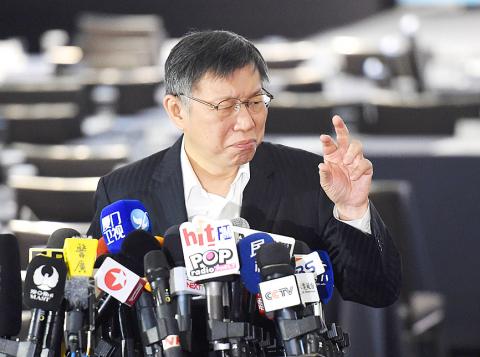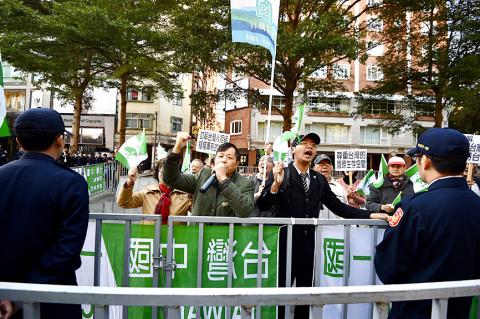Shanghai Vice Mayor Zhou Bo (周波) expressed his willingness to forge cooperation with more cities and counties in Taiwan — provided that they have an “accurate perception” of the nature of cross-strait relations — as he touted the achievements of the annual Taipei-Shanghai Forum that opened in Taipei yesterday morning.
This year’s forum was themed “sustainable cities, sustainable development,” with a special focus on a circular economy. Other topics discussed at the event included public housing; urban renewal; healthcare; movie and fashion culture; and waste disposal and repurposing.
“As long as they have an accurate perception about cross-strait ties and exchanges, we are willing to begin cooperation with more of Taiwan’s cities and counties,” Zhou said when asked why China has been willing to interact with Taipei Mayor Ko Wen-je (柯文哲), even though he has only endorsed the idea that “both sides of the [Taiwan] Strait are one family” and not the so-called “1992 consensus.”

Photo: Huang Yao-cheng, Taipei Times
Ko has had a clear and consistent perception of cross-strait relations, which Zhou said is “highly conducive” to enhancing cooperation and exchanges across the Taiwan Strait.”
“We believe adherence to the idea of ‘both sides of the Strait are one family’ will allow cooperation between Shanghai and Taipei to be further expanded,” he said.
Zhou made the remarks at a news conference after the opening ceremony of the forum, which was held at the Regent Taipei hotel and was attended by 135 representatives from Shanghai and 250 representatives from Taipei.

Photo: Peter Lo, Taipei Times
The “1992 consensus” refers to a tacit understanding between the Chinese Nationalist Party (KMT) and the Chinese Communist Party that both sides acknowledge there is “one China,” with each side having its own interpretation of what “China” means.
Former Mainland Affairs Council minister Su Chi (蘇起) in 2006 admitted to making up the term in 2000.
China’s Taiwan Affairs Office has made acknowledgement of the “1992 consensus” a prerequisite for cross-strait exchanges, but some politicians, including Ko, have chosen to meet Beijing’s demand halfway by supporting the “one family” idea.

Photo: Peter Lo, Taipei Times
Zhou also embraced the idea of expanding the forum, now in its ninth year, to include Kaohsiung, but said how a three-city forum could work is an issue that needs to be discussed by all concerned parties.
There has been speculation that closer exchanges would be seen between Kaohsiung and Chinese cities after Kaohsiung mayor-elect Han Kuo-yu (韓國瑜) — who is to be the city’s first KMT mayor in 20 years and who has publicly endorsed the “1992 consensus” — takes office on Tuesday.
At his news conference, Ko defended his decision to use “both sides of the Strait are one family” again at a dinner the Taipei City Government threw for Zhou’s delegation on Wednesday, despite previously lamenting the “stigmatization” of the phrase, as well as the term “1992 consensus.”
"I used that phrase in 2015 and last year. Like I said at the very beginning, we should avoid throwing a wild card and should just stick to old practices,” Ko said, adding that his approach is to find an option acceptable to most people, as it is impossible to find one that satisfies everyone in a democracy.
However, Ko, who was re-elected in the Nov. 24 nine-in-one elections, revealed that he has suggested to Beijing that efforts should be made to develop a new term that both sides find tolerable to replace the “1992 consensus” and the “one family” idea.
Given that both terms have been given a political label, neither can now be used without upsetting some people, he said.
At the event’s main session, Zhou said that Shanghai has benefited tremendously from the annual forum and has put into practice the lessons it learned from Taipei, including the establishment of a service hotline for residents.
Taipei Deputy Mayor Teng Chia-chi (鄧家基) said he hopes that the forum can help overcome the differences between the two cities and pave the way for the peaceful development of cross-strait relations.
“What we have observed since last month’s elections is that the pan-blue, pan-green and pan-white camps have all agreed on the importance of expanded interactions. Hopefully, Taipei’s and Shanghai’s positive interactions could be a catalyst for more comprehensive exchanges across the Taiwan Strait,” he said.
Three memorandums of understanding were inked at the forum: one for the cultivation of young athletes in Taipei and Shanghai; one for exchanges between Taipei’s Datong District (大同) and Shanghai’s Jiading District; and one for cooperation between the Taipei Film Commission and the Shanghai Broadcasting Film and Television Producers Association.

A magnitude 7.0 earthquake struck off Yilan at 11:05pm yesterday, the Central Weather Administration (CWA) said. The epicenter was located at sea, about 32.3km east of Yilan County Hall, at a depth of 72.8km, CWA data showed There were no immediate reports of damage. The intensity of the quake, which gauges the actual effect of a seismic event, measured 4 in Yilan County area on Taiwan’s seven-tier intensity scale, the data showed. It measured 4 in other parts of eastern, northern and central Taiwan as well as Tainan, and 3 in Kaohsiung and Pingtung County, and 2 in Lienchiang and Penghu counties and 1

FOREIGN INTERFERENCE: Beijing would likely intensify public opinion warfare in next year’s local elections to prevent Lai from getting re-elected, the ‘Yomiuri Shimbun’ said Internal documents from a Chinese artificial intelligence (AI) company indicated that China has been using the technology to intervene in foreign elections, including propaganda targeting Taiwan’s local elections next year and presidential elections in 2028, a Japanese newspaper reported yesterday. The Institute of National Security of Vanderbilt University obtained nearly 400 pages of documents from GoLaxy, a company with ties to the Chinese government, and found evidence that it had apparently deployed sophisticated, AI-driven propaganda campaigns in Hong Kong and Taiwan to shape public opinion, the Yomiuri Shimbun reported. GoLaxy provides insights, situation analysis and public opinion-shaping technology by conducting network surveillance

‘POLITICAL GAME’: DPP lawmakers said the motion would not meet the legislative threshold needed, and accused the KMT and the TPP of trivializing the Constitution The Legislative Yuan yesterday approved a motion to initiate impeachment proceedings against President William Lai (賴清德), saying he had undermined Taiwan’s constitutional order and democracy. The motion was approved 61-50 by lawmakers from the main opposition Chinese Nationalist Party (KMT) and the smaller Taiwan People’s Party (TPP), who together hold a legislative majority. Under the motion, a roll call vote for impeachment would be held on May 19 next year, after various hearings are held and Lai is given the chance to defend himself. The move came after Lai on Monday last week did not promulgate an amendment passed by the legislature that

AFTERMATH: The Taipei City Government said it received 39 minor incident reports including gas leaks, water leaks and outages, and a damaged traffic signal A magnitude 7.0 earthquake struck off Taiwan’s northeastern coast late on Saturday, producing only two major aftershocks as of yesterday noon, the Central Weather Administration (CWA) said. The limited aftershocks contrast with last year’s major earthquake in Hualien County, as Saturday’s earthquake occurred at a greater depth in a subduction zone. Saturday’s earthquake struck at 11:05pm, with its hypocenter about 32.3km east of Yilan County Hall, at a depth of 72.8km. Shaking was felt in 17 administrative regions north of Tainan and in eastern Taiwan, reaching intensity level 4 on Taiwan’s seven-tier seismic scale, the CWA said. In Hualien, the